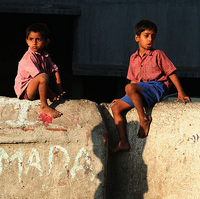India continues to burnish its international image with initiatives like Brand India, a public-private campaign whose stated mission is to "build positive perceptions of India globally." But when Indian Prime Minister Manmohan Singh acknowledged the country's undernourished children as a "national shame," it highlighted how India's economic success co-exists with its persistently high rates for hunger, malnutrition, and income poverty. According to the World Bank, 46 percent of Indian children below the age of five are underweight, and the World Food Program says that 230 million Indians are living with hunger.
Clearly India's robust 8 percent growth in GDP does not automatically lift all boats. Poverty reduction and nutrition improvement come as a result of social programs, and therein lies the problem for India. Good intentions from the central government in both words and investment can go only so far when corruption and systemic failures at the state level are routine, initiative dormant and social structures restrictive.
"Growth is good. You can't have social programs without growth," says Columbia University's Arvind Panagariya. "But there are a lot of people -- tribal peoples, for example -- [that] growth won't reach. Growth alone won't help."

